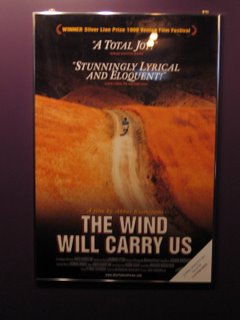Tine Is Tailed by a Teapot
Ever since Tine noticed several days ago an ad for England's Coast to Coast Walk on her blog, she's taken a keen interest in the ads on her site.
(The entry on the ad for the long-distance
walk, titled "A Nice Cup of Tea," is on this page:
http://villagewalks.blogspot.com/2006_01_02_villagewalks_archive.html)
After Tine nearly got bonked on the head by snow bombs, there was an advertisement for a sale on falling snow. When Tine unearthed an Egyptian mummy in her village, an ad for Egyptian singles appeared the next morning.
Tonight Tine pointed out to Rubob a new ad for tea on her blog. Rubob isn't particularly interested in ads, especially not right before bedtime, but he does like tea, so he took a look.

"I think they're tailing me, Rubob," Tine said. "How did they know we liked tea so much?"
"They're tailored ads, that's all," Rubob said.
"Even if they're nicely dressed, Rubob, I don't think I like the idea of them tailing me to the teashop in Millerton."
"They're tea ads, Tine, and you like tea. You've been hoping for a tea ad to replace all those Egyptian mummy ads."
"Perhaps you're right. I don't think I'd like to be followed by an Egyptian mummy, even if he were nicely dressed," Tine said, beginning to nod off. "I'd much prefer to be followed by that perambulating teapot we saw yesterday at the teashop."

"Perambulating teapot?" Rubob wondered. "You're a silly thing, little Tine," he said wearily (but with affection).
"Not for all the tea in China," Rubob thought, looking over at Tine in her woolen nightcap.
(The entry on the ad for the long-distance
walk, titled "A Nice Cup of Tea," is on this page:
http://villagewalks.blogspot.com/2006_01_02_villagewalks_archive.html)
After Tine nearly got bonked on the head by snow bombs, there was an advertisement for a sale on falling snow. When Tine unearthed an Egyptian mummy in her village, an ad for Egyptian singles appeared the next morning.
Tonight Tine pointed out to Rubob a new ad for tea on her blog. Rubob isn't particularly interested in ads, especially not right before bedtime, but he does like tea, so he took a look.

"I think they're tailing me, Rubob," Tine said. "How did they know we liked tea so much?"
"They're tailored ads, that's all," Rubob said.
"Even if they're nicely dressed, Rubob, I don't think I like the idea of them tailing me to the teashop in Millerton."
"They're tea ads, Tine, and you like tea. You've been hoping for a tea ad to replace all those Egyptian mummy ads."
"Perhaps you're right. I don't think I'd like to be followed by an Egyptian mummy, even if he were nicely dressed," Tine said, beginning to nod off. "I'd much prefer to be followed by that perambulating teapot we saw yesterday at the teashop."

"Perambulating teapot?" Rubob wondered. "You're a silly thing, little Tine," he said wearily (but with affection).
"Not for all the tea in China," Rubob thought, looking over at Tine in her woolen nightcap.







